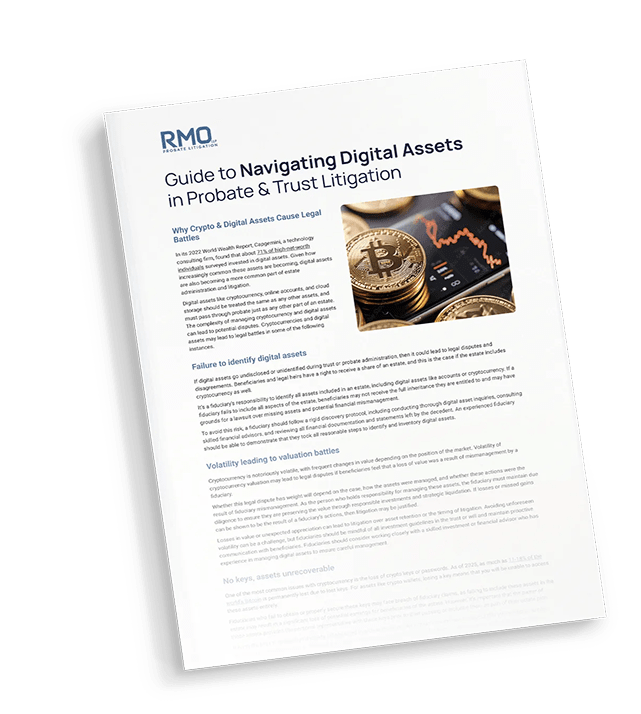Guide to Navigating Digital Assets in Probate & Trust Litigation
As technology expands, digital assets like cryptocurrency and online accounts are becoming an increasingly common consideration in estate planning and are an important part of settling an estate after death. Our guide covers the ins and outs of navigating cryptocurrency inheritance and managing other digital assets in probate or trust administration.
Download Our White Paper to Understand How Cryptocurrency Works With Trust and Probate Litigation
Our whitepaper offers insight into how cryptocurrency and other related digital assets might affect the probate or trust administration process. In some cases, these challenges could lead to litigation or legal disputes. Download this guide to understand the common challenges that can arise, how to avoid them, and what steps you should take for a smooth trust or probate administration process.

What You'll Learn From This White Paper
Our white paper covers several topics to give you insight into how you should approach the trust or estate administration processes when digital assets are involved. In this resource, you’ll receive:
- An overview of cryptocurrency and its influence on legal battles during probate or trust administration
- An understanding of the common challenges of dealing with cryptocurrency in probate
- A guide on what steps to take as an executor and trustee of an estate or trust with digital assets
- A guide on what steps to take as a beneficiary who expects to inherit digital assets in the probate or trust administration process
All together, this guide gives you a starting point for gaining clarity into how trust or estate litigation may work. This guide, along with the support of a skilled probate and trust administration attorney, offers you the tools to begin navigating the management of cryptocurrency and digital assets during probate.
Frequently Asked Questions
What makes cryptocurrency difficult to manage in probate or trust administration?
Challenges like accessing digital keys, identifying the full portfolio of digital assets, and inexperienced personal fiduciary representatives can all make cryptocurrency difficult to manage in probate or trust administration. A significant challenge in managing cryptocurrency during probate and trust administration is that these currencies and related digital assets are still relatively new, and understanding how they work in probate is not yet common knowledge for everyone.
How can a trust or probate litigation attorney help with cryptocurrency disputes?
A trust or probate litigation attorney can help with cryptocurrency disputes in several ways, such as gathering evidence to understand the nature of the dispute and building a case to defend either side in mediation or litigation. As with any dispute during probate or trust administration, you should contact an attorney as soon as possible if you experience any issues.
What happens if cryptocurrency is not disclosed in an estate plan?
If cryptocurrency is not disclosed in an estate plan, it could lead to several issues. A failure to disclose cryptocurrency assets may lead to them being lost, forgotten, or ultimately unrecoverable. A failure to include it in the overall estate distribution process means that beneficiaries could be missing out on a valuable piece of their inheritance.
What happens if no one has the private keys to a deceased person’s crypto wallet?
If no one has the private keys to a deceased person’s crypto wallet, then it is often advisable to consult a skilled probate or trust litigation attorney. They may contact the decedent’s financial advisor or engage the support of a private investigator to uncover whether the decedent left these private keys anywhere.
Ultimately, however, if nobody is able to uncover or find these private keys, then the crypto wallet and all funds within it may be lost forever. If this is the case, then the estate will lose these assets entirely and there may be no chance for the beneficiaries to inherit these finances.
How can crypto volatility lead to legal disputes in estate administration?
Crypto volatility can lead to legal disputes in estate administration if it vastly affects the value of the estate or an individual’s inheritance. The natural volatility of the cryptocurrency market may result in a loss of value for the estate and its beneficiaries if unforeseen market dips occur.
A beneficiary or legal heir may raise a legal dispute if they feel that assets were managed, invested, or handled irresponsibly in a manner that led to financial losses. In these disputes, it will be necessary for the fiduciary to take all possible steps to responsibly manage these assets and diligently document these steps.
Why is fiduciary selection critical when digital assets are involved?
Fiduciary selection is crucial when digital assets are involved, as not all fiduciaries are equipped to handle the responsibilities of managing digital assets, handling crypto in trust litigation, and the requirements that come with these. For example, if a fiduciary is not well-versed in identifying digital assets or is unsure how to gather the passkeys to access them, it could jeopardize the ability of beneficiaries to receive access to their rightful inheritance.
It’s important to choose a fiduciary that understands the importance of digital assets in settling an estate. A skilled fiduciary will ensure that assets are properly inventoried, safeguarded, managed in accordance with the will, and distributed to the appropriate beneficiaries.
Are fiduciaries personally liable for losses in cryptocurrency value?
A fiduciary can be held liable for losses in cryptocurrency value if the losses were a result of a breach of fiduciary duty. Fiduciaries have a responsibility to manage these assets carefully and take all possible steps to preserve their value. Negligence in this responsibility could leave a fiduciary personally liable for the losses to the estate.
However, if it can be proven that the fiduciary handled these assets responsibly and while operating within their due diligence, then it’s likely that they will be absolved of liability. Still, you should always consult a skilled trust or probate litigation attorney regarding the unique circumstances of your case to understand how to move forward.
Free Consultation
A member of the RMO Client Relations team will reach out to gather additional information concerning the parties to your case and schedule your consultation.
Communication Disclaimer
Please note that communications by you to RMO LLP or any of its lawyers through this website do not create an attorney-client relationship between you and the firm. Do not send any privileged or confidential information to the firm through this website or otherwise until instructed in writing from us to do so.

